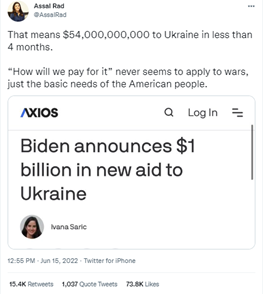When conservatives applaud unlimited war spending, they not only harm our economy and body politic, but they give the Left a powerful talking point. Original Article: “War Spending Gives MMTers and the Left a Strong Talking Point” Time and time again, prowar spending concedes one of the Left’s most convincing points. As Assal Rad tweeted recently, we will have sent ,000,000,000 to Ukraine in less than 4 months. “How will we pay for it” never seems to apply to wars, just the basic needs of the American people. To an outside observer, not paying close attention for any number of justifiable reasons, this strikes strongly. The Right regularly challenges that we cannot afford certain things, but if we can afford foreign aid in wars we have no business in,
Topics:
Connor Mortell considers the following as important: 6b) Mises.org, Featured, newsletter
This could be interesting, too:
Nachrichten Ticker - www.finanzen.ch writes Die Performance der Kryptowährungen in KW 9: Das hat sich bei Bitcoin, Ether & Co. getan
Nachrichten Ticker - www.finanzen.ch writes Wer verbirgt sich hinter der Ethereum-Technologie?
Martin Hartmann writes Eine Analyse nach den Lehren von Milton Friedman
Marc Chandler writes March 2025 Monthly
When conservatives applaud unlimited war spending, they not only harm our economy and body politic, but they give the Left a powerful talking point.
Original Article: “War Spending Gives MMTers and the Left a Strong Talking Point”
Time and time again, prowar spending concedes one of the Left’s most convincing points. As Assal Rad tweeted recently, we will have sent
$54,000,000,000 to Ukraine in less than 4 months.
“How will we pay for it” never seems to apply to wars, just the basic needs of the American people.
To an outside observer, not paying close attention for any number of justifiable reasons, this strikes strongly. The Right regularly challenges that we cannot afford certain things, but if we can afford foreign aid in wars we have no business in, then why can’t we simply prioritize many of the Left’s calls for various social programs?
In fact, this is not nearly the first time that this issue has come up. In 2019, during the Democratic presidential debate, Senator Elizabeth Warren simply swept off the criticism of the cost of her plan with the claim:
So, look. Let’s be clear about this. We are the Democrats. We are not about trying to take away healthcare from anyone. That’s what the Republicans are trying to do. And we should stop using Republican talking points in order to talk with each other about how to best provide that healthcare.
The “intellectual” backing for this belief that costs are just a Republican talking point stems from modern monetary theorists. In 2020, Robin Kaiser-Schatzlein wrote an article referencing one of the faces of modern monetary theory, Stephanie Kelton, entitled “The Government Can Afford Anything It Wants.” And what example best showed that the government is not limited by costs?
The Federal Reserve does not dip its hands into a pot of “tax dollars” to pay military contractors, nor is it required to check some mythical account where tax dollars live before it wires the money.
Also
as we have seen, MMT is already practiced by warmongering politicians who see no problem with unlimited spending
To an Austrian, the answer to the question of how we can afford all this war mongering but not these various social programs is simple: we cannot afford either, and we should not want to afford either. It is easy to look at the last twenty years – and realistically much further – and see the catastrophic effects that the limitless spending on war have had on our economy. Frank Shostak has shown in his Mises Wire article “The Myth of the War Shock” that the most detrimental feature of war for our economy is its effect on the business cycle:
In contrast to recessions, or economic busts, which are about the liquidation of non-productive activities, war on the contrary contributes to the increase in non-productive activities. In short, war, in contrast to an economic bust, gives rise to non-productive and destructive activities, which undermine the pool of real funding, and therefore undermines future prospects for economic growth. In this regard, it produces similar results to that of an economic boom, i.e., it gives rise to non-productive activities. Moreover, if the pool of real funding is expanding, war generates an illusion of economic prosperity.
As Austrians, we know that this boom caused by an illusion of economic prosperity is inevitably followed by a bust, as the illusion is eventually shattered. This means that this limitless war spending does in fact have catastrophic effects on the economy even if MMTers and those influenced by them gloss over these effects. We, in fact, cannot afford these. And “How will we pay for it?” is not just a Republican talking point that does not apply to wars.
Every time this debate returns to the surface, we must hammer it home, repeatedly. War is already the most grotesque of the state’s crimes, and the evil of it should be fought against on every moral ground imaginable. In addition to that, it cannot keep being ignored that we absolutely cannot afford these wars or the devastating economic effects that ripple forth from attempting to pay for them.
This Audio Mises Wire is generously sponsored by Christopher Condon.
Tags: Featured,newsletter









